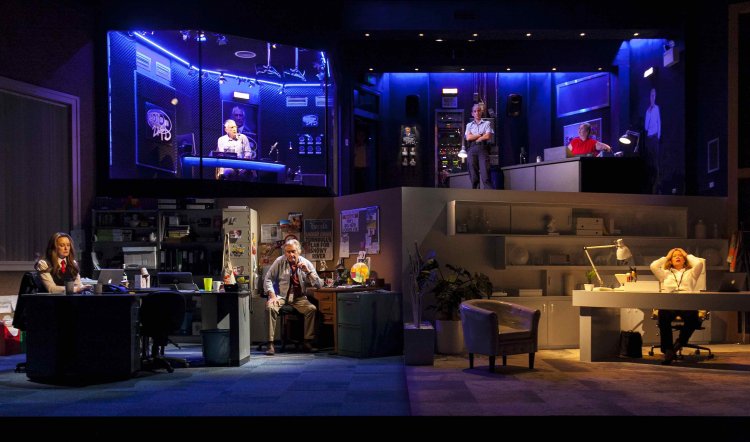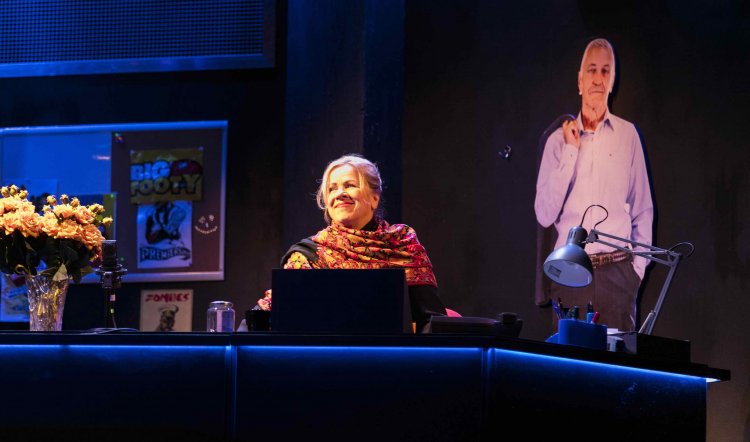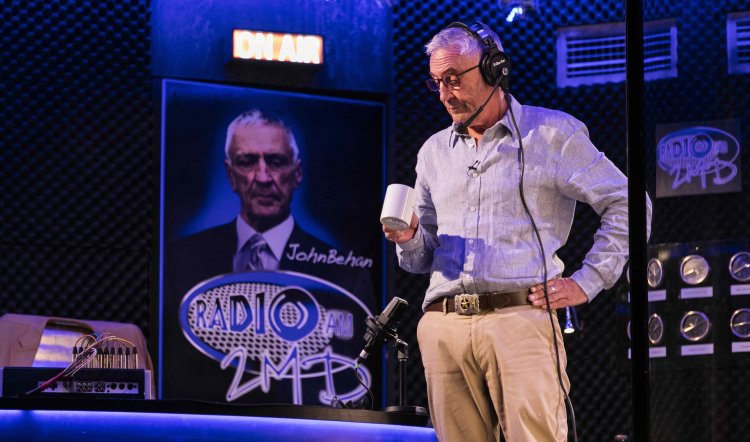
TALK
TALK, Sydney Theatre Company at the Drama Theatre, Sydney Opera House, 3 April-20 May 2017. Photography by Brett Boardman - above: the company and the set; below: Valerie Bader; below again: John Waters
Max Bialystock of The Producers infamy, gave a warning for the ages when he counselled, “Don’t put ya own money in da show”. It’s a pity he wasn’t given the lines to add an even more important dictum: “And fah chrissakes don’t direct ya own show”. If followed, these two simple edicts could, over the ages, have saved a lot of heart ache, but it’s amazing how few, particularly the smartest and most talented, heed the advice.
As director, Jonathan Biggins scored a much deserved triumph with a production for STC in 2014 of the Michael Frayn masterpiece, Noises Off. Before that – 2012 – Biggins had a notable success with his first full length play, the satirical comedy Australia Day. It’s premiere production was directed for STC/MTC by Richard Cottrell, and another, for QTC, by Andrea Moor.
And now comes Biggins’ latest: Talk, three years in the writing and a satirical dramedy about the dangerously serious mess that is the media today. It’s a promising premise, with John Waters as John Behan, the unholy spawn of Derryn Hinch and Alan Jones – a commercial radio shock jock so convinced of himself he literally cannot be silenced.
Behan has caused the trial of an alleged pedophile to be aborted when he announces on air that there had been another instance nine years previously. The police arrive at the radio station to arrest him and he barricades himself in the studio and stays on air to become the story.
At this point an officially appointed dramaturg, or a director who was not also the loving author of the piece, might have realised that the real focus of the action should be Dani (Paige Gardiner), a baby ABC radio hackette whose recently awarded Communications degree from UTS gives her confidence where none is warranted.

Instead, the potentially sharp critique of everything that’s wrong with today’s Twitter-based “news” is diffused and blurred by other factors. Most promising is Julie Scott (Hannah Waterman) the newly imported – judging by her mid-Thames accent – acting editor of the Daily Telegraph. Julie is caught between the demands of tabloid headlines and the economic pressures being exerted on her and her own old fashioned instincts for the story (how, what, where, why – and never mind how Twitter is trending).
This same dilemma is facing Taffy Campbell (Peter Kowitz) as he tries to deal with young Dani while packing up his desk prior to retiring from a long career at the ABC.
These two are accommodated in lovingly-detailed offices on the ground floor of Mark Thompson’s ingenious two-tiered set. The ABC office is a pit of regulation furniture and the accumulations of 20+ years, while the fragrant tabloid editor’s contemporary lair contains a desk almost as imposing as that which Ita Buttrose sat behind while briefly editor of the SunHerald.
On the set’s top level is the glass box studio and producer’s office at the radio station, each defined at various times by cunning lighting schemes (Trent Suidgeest) that illuminate with appropriate emphasis and character the scene of the moment. It’s here that the magnificent Valerie Bader is wasted as Behan’s long-suffering producer and Kenneth Moraleda performs one of his roles – a cliched Asian sidekick.
A more polite way of looking at the supporting characters would be to describe them as archetypes rather than cliches, but they amount to the same: taking up oxygen and stage time that could better be used to flesh out the main characters and plot(s). Andrew Tighe’s main contribution is to wear a couple of unlikely wigs and manfully battle with roles as the radio station boss and also Taffy’s ABC manager. Lucia Mastrantone can do little with her police media liaison officer, while Helen Christinson and Ben Wood make the most of their police officers. It’s the fault of none of these fine actors that their roles are mostly one dimensional, two at most.

The play runs for an hour and 40 minutes straight through and 20 of those minutes could be cut without blood being spilled. For instance, the laconic Taffy is actually Scottish. He is asked why he has a Welsh name although he is obviously Scottish (not so obvious, but never mind) and he explains at length that his mother...well, you get the picture. A dramaturg, or director who hadn’t written and become rusted on to this lame exchange, would have cut the scene altogether.
The sad thing is, there is a lot that needs to be explored and said about news – fake and otherwise – at the moment, and Biggins touches on much that could be developed and expanded. For instance, he has a sniff around the popular notion that all opinions and information sources now matter equally, although it actually means news is utterly devalued by its alleged democratisation; but then he dumps that strand and moves on.
When statistics tell us that most people get their information about the world from Facebook and Twitter while journalists mindlessly run to catch up, a taut, focused hard-nosed – and funny – play about new media v news media would be valuable and entertaining. Sadly, Talk isn’t that play. Although intermittently funny and occasionally insightful, too much work needs to be done on the text before it really zings, and the pace is stately when it should fly. Back to the drawing board.



